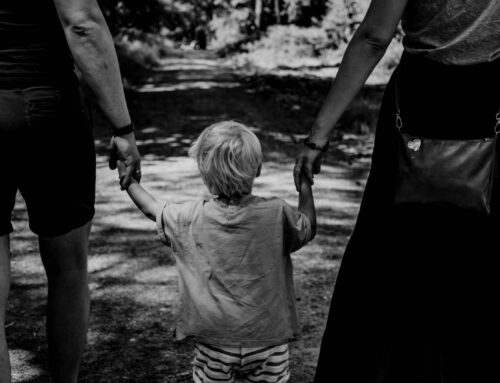When parents divorce, they have great concern about how their children will be affected. Parents want to protect their children from harm and are fearful the divorce will harm them. Yet a parent’s own negative feelings about the other parent and the divorce can leave children caught in the middle of their parents dispute. Children sensing a parent’s negative feelings for their other parent absorb the tensions as they transition back and forth between homes. Or worse, parents argue about parenting time, child support, or other topics about the children. The children become stuck in between their parents’ conflicts. Children stuck in the middle of parents’ conflicts have a more difficult time adjusting to the divorce and are more likely to have other behavioral or mental health challenges.
An antidote to your children being caught in the middle of your divorce conflicts is to shift to a child-centered approach to co-parenting. A child-centered approach keeps your children at the center of your attention. What does it mean to keep your children at the center? It means shifting from thoughts and feelings about your former spouse and the divorce from your own perspective as a spouse (your adult personal thoughts and feelings) to considering your child’s thoughts and feelings about their other parent and the divorce from the perspective as your child’s parent. It is critical to realize that these are two separate and different things! Your children have different thoughts and feelings about their other parent than you do. That may seem obvious, but it’s not uncommon for parents to allow their own thoughts and feelings to influence what they say and how they act with and in front of their children.
“Child-centered” focuses on what your child thinks, feels, and needs. Children usually need to be able to love both of their parents, go back and forth with ease between houses, and to feel good about things they do with their other parent, to look forward to spending time with that parent, and to be relaxed at their activities in public when both parents are present. Considering how your child feels and what your child needs is a thoughtful parenting and co-parenting approach to making decisions for and about your child. Making parenting decisions out of your own strong feelings puts your child in the middle of your emotional experience rather than at the center of your thoughtful consideration.
[Tweet “Keep your children at the center of your family and out of the middle of your adult conflicts.”]
Don’t lose sight of your children because your vision is clouded with the hurt, mistrust, anger, and pain of your divorce. Keep your children at the center of your open-hearted, thoughtful parenting. Keep your focus centered on their needs, always being mindful that they love both of their parents. Remain centered on their need to be able to focus on their childhood, their development, their feelings, and the freedom to love everyone in their family. When you do this, your children will be protected from being caught in the middle of your own adult conflicts. As a result, when they are adults looking back on their childhood, they will remember that you protected them from adult conflicts and gave them the freedom to have their childhood and their whole family.





